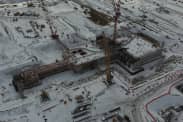TOKYO — Asian stocks slipped on Thursday, tracking a weak start to 2024 on Wall Street as Japan’s markets reopened.
In Tokyo, the mournful mood was clear as the market began the year with a moment of silence instead of a celebratory New Year’s ring of the bell after a major earthquake left at least 77 people dead and dozens missing.
Dark-suited officials bowed their heads on a stage, instead of the customary women clad in colorful kimonos. Japan’s benchmark Nikkei 225 JP:NIK fell 1.2%.
Hong Kong’s Hang Seng HK:HSI shed 0.6% and the Shanghai Composite index CN:SHCOMP sank 1%.
Australia’s S&P/ASX 200 AU:XJO declined 0.4%, while South Korea’s Kospi KR:180721 declined 0.8%.
Stocks fell on Wall Street, as the slow start to the year there stretched into a second day.
The S&P 500 SPX lost 0.8% to 4,704.81, though it remains within 2% of its record set exactly two years ago. The Dow Jones Industrial Average DJIA dropped 0.8%, from its own record to 37,430.19. The Nasdaq composite COMP led the market lower with a drop of 1.2%, to 14,592.21.
A couple of reports released Wednesday morning indicated the overall economy may be slowing from its strong growth last summer, which the Federal Reserve hopes will keep a lid on inflation. The risk is it might slow too much.
One report showed U.S. employers were advertising nearly 8.8 million job openings at the end of November, down slightly from the month before and the lowest number since early 2021. The report also showed slightly fewer workers quit their jobs during November.
The Fed is looking for exactly such a cooldown, which it hopes will limit upward pressure on inflation without a need for widespread layoffs.
“These data will be welcome news for policymakers,” said Rubeela Farooqi, chief U.S. economist at High Frequency Economics.
A second report from the Institute for Supply Management showed the U.S. manufacturing industry is improving by a touch more than economists expected, but it’s still contracting. Manufacturing has been one of the hardest-hit areas of the economy recently, while the job market and spending by U.S. households have remained resilient.
Treasury yields slumped immediately after the reports and then yo-yoed though the day. The yield on the 10-year Treasury eventually slipped to 3.91% from 3.94% late Tuesday. It’s been generally falling since topping 5% in October, when it was putting strong downward pressure on the stock market.
Traders are largely betting the first cut to interest rates could happen in March, and they’re putting a high probability on the Fed cutting its main rate by least 1.50 percentage points during 2024, according to data from the CME Group. The federal funds rate is currently sitting within a range of 5.25% to 5.50%.
Even if the Federal Reserve pulls off a perfect landing to shimmy away from high inflation without causing an economic downturn, some critics also say the stock market has simply run too far, too fast in recent months and is due for at least a pause in its run.
In energy trading, benchmark U.S. crude CLG24 added 25 cents to $72.95 a barrel in electronic trading on the New York Mercantile Exchange. It jumped $2.32 a barrel on Wednesday as worries flared over the risk that the Israel-Hamas war might spread to other parts of the Middle East.
Brent crude BRNH24, the international standard, added 14 cents to $78.39 a barrel.
In currency trading, the U.S. dollar
USDJPY,






